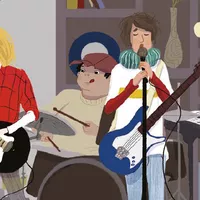Chapitre 4. "Musique en tête"
Margot est assise devant le piano du conservatoire. Elle n'a pas joué comme ça depuis longtemps. Le travail de ces dernières semaines a porté ses fruits. Ses doigts sont agiles et réussissent à interpréter les phrases musicales répétitives si rapides et si fatigantes d'habitude. Les cascades musicales s'enchaînent dans le bon rythme. Finalement, Margot tient l'impromptu n°4 de Schubert jusqu'à la dernière note ! Elle est heureuse. Un silence suit. Soudain, une voix derrière elle dit :
‒ Bravo Margot.
‒ Merci.
‒ En tant que professeur de musique, je pourrais toujours trouver des choses à te dire pour améliorer ton travail, mais j'ai entendu une musique qui vient de toi. Tu t'es exprimée à travers la musique. Je sais depuis longtemps que tu es une vraie artiste et je viens d'en avoir la preuve.
‒ Merci.
‒ Je suis sincère et tu sais que je suis sévère. C'est moi qui te remercie pour ton interprétation. Maintenant, j'espère que tu joueras aussi bien pour le concert.
Margot sort émue du conservatoire. Elle rallume son portable et lit un message de Lucien.
« Salut ! Tu viens ce soir à notre répét ! On t'attend ! »
C'est vrai… elle a accepté d'assister à la répétition du groupe. Si elle reste juste une heure, ses parents ne diront rien. Elle téléphone rapidement à sa mère pour la prévenir. Elle doit se dépêcher car les « Déterminales » répètent dans une cave dans le quartier de Belleville. Margot prend le métro ligne 2. À cette heure-ci, il y a tous les travailleurs qui rentrent chez eux. Les gens ont le visage fermé et ont l'air fatigué. Margot pense à cette phrase « Métro-Boulot-Dodo » et espère de tout son coeur que plus tard elle sera libre de faire un métier qui lui plaît vraiment. Ce soir, la jeune fille est pleine de musique et se sent vivre. Elle est heureuse.
Margot est dans le métro. Elle aime bien la partie aérienne de la ligne 2. C'est agréable de voir la ville d'en haut. La jeune fille descend à la station Belleville. C'est un quartier très animé : des vendeurs de rues chinois vendent des spécialités culinaires, une foule cosmopolite se presse dans les rues. Margot retrouve Lucien et sa bande de musiciens dans un studio de répétition de la rue Denoyez. Thomas, le chanteur, alterne les textes en anglais et en français et il joue de la guitare. Lucien est guitariste, mais aussi bassiste. Greg joue du clavier. Enfin, Walid joue de la batterie. On voit tout de suite que ces garçons sont de bons copains. On sent une harmonie et une belle amitié entre eux. Les instruments se répondent et chaque musicien laisse la place aux autres pour s'exprimer. En les observant, Margot ne se souvient plus pourquoi elle les trouvait prétentieux avant… Elle écoute et elle doit avouer qu'elle aime bien ce qu'ils font. Elle se sent même privilégiée d'assister à leur travail. Les morceaux s'enchaînent. Les musiciens s'arrêtent, discutent, font des propositions. Ils essaient à chaque fois d'améliorer leurs morceaux.
Les amis rient aussi beaucoup et interpellent Margot, leur spectatrice :
‒ Alors Margot, que penses-tu de ces accords ? demande Lucien. Moi, je ne trouve pas ça génial…
La jeune fille n'ose pas prendre position. Elle ne connaît pas assez bien ces garçons. Et c'est gênant de critiquer le travail de création des autres…
Tout à coup, Margot regarde sa montre : 19 heures ! Oh là là ! Il faut qu'elle rentre. Elle est déjà en retard. Sa mère ne va pas être contente du tout. Margot s'excuse :
‒ Je suis désolée Lucien, je dois vraiment partir. Mes parents m'attendent !
‒ Je comprends. Mais, tu ne voudrais pas jouer avec nous, juste un morceau ?
‒ Mais, je joue du classique moi.
‒ Tu pourrais improviser du classique avec notre rock. D'autres artistes ont déjà fait ça.
‒ Peut-être, mais je ne sais pas improviser. Je suis désolée et en plus je dois vraiment rentrer.
‒ D'accord ! Alors à plus.
‒ Oui, à bientôt. Salut !
Margot sort. Dans la rue, elle se sent légère et portée par toute la musique qu'elle vient d'entendre. Les morceaux résonnent dans sa tête. Elle a envie de danser et de chanter aussi. Mais surtout, elle a envie de s'asseoir devant son clavier !
Margot passe les semaines suivantes de manière très studieuse. Elle réussit à réviser correctement le bac français et à travailler ses morceaux de musique. Son professeur est d'ailleurs très satisfait. Le mois de juin est chaud et ensoleillé cette année à Paris. C'est rare ! Margot déteste le printemps dans la capitale parce que le ciel est tout le temps gris et qu'il fait froid. Elle ne peut jamais mettre ses petites robes d'été… Mais cette année, le temps est particulièrement beau.
Les semaines se ressemblent : lycée, copains, discussions avec Clara, devoirs, révision du français et piano. Le concert approche aussi. Margot n'a plus revu Lucien. Les amis se sont échangés quelques messages : Lucien l'encourage à chaque fois. Il écrit : « Joue ! Joue ! J'ai hâte de t'entendre ! »
Il lui donne aussi des conseils sur l'interprétation de la musique et il lui fait découvrir des musiciens de jazz. Il l'a invitée à aller écouter des concerts, mais Margot a refusé : elle n'a pas le temps et ses parents ne voudront jamais, Margot le sait.

